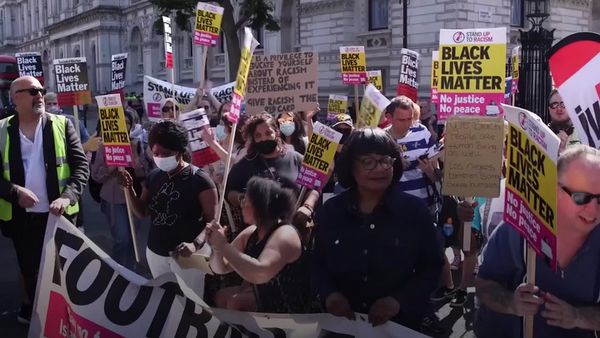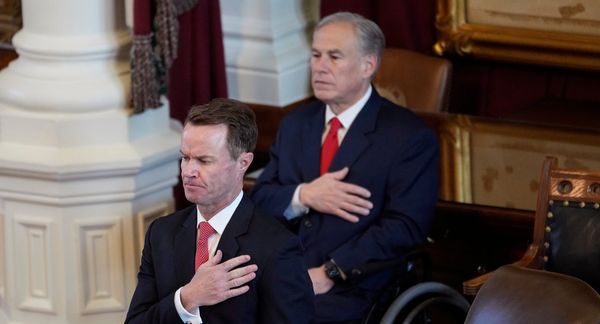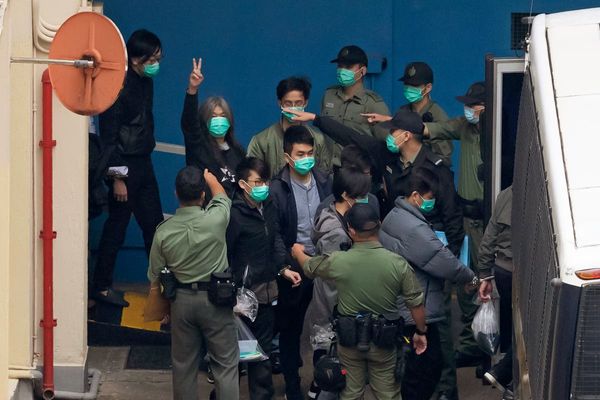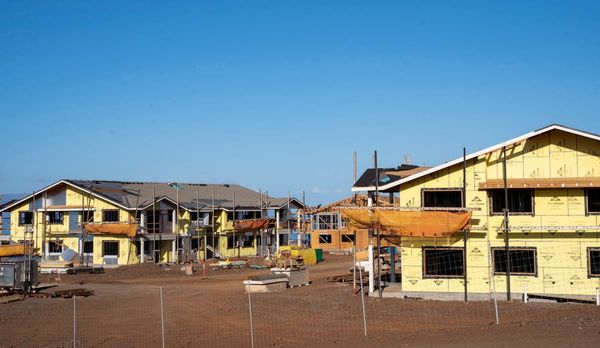
As the “foreign influence” bill was being nodded through the Georgian parliament’s legal committee at 9am on Monday, a wet and tired Zviad Tsetskhladze, 18, and Luka Natsvlishvili, 17, were among thousands of protesters left with little option other than to shout chants at a grim wall of riot police.
An overnight vigil designed to block the governing party’s MPs from accessing the parliamentary estate had failed. Meanwhile, the opposition leader in the parliament, Tina Bokuchava, 40, had barely made it past the entrance of the imposing stone building. Her colleagues on the committee only got as far as the corridor outside.
In the end, it took just 67 seconds for the new law to be approved after a path through the protest for MPs from the governing party, Georgian Dream, was made by the serried ranks of masked police officers bristling with water cannon and teargas canisters.
A full and final vote of the parliament has been announced for Tuesday, which is also expected to be a simple affair. The governing party has the votes. The expected veto of the anti-government president, Salome Zourabichvili, can be overruled by a parliamentary majority.
There appears to be little to stop the progress of a bill that, if passed, will oblige media or civil society groups in Georgia that receive more than 20% of their funding from abroad to register themselves as “organisations serving the interests of a foreign power”.
The draft bill has been described by the US state department as a “Kremlin-inspired” tool to hound independent media and opposition voices in a country that has long teetered between the Russian and western spheres of influence but whose government now appears to be leaning towards Moscow.
Brussels has made it crystal-clear that the legislation will be an obstacle to Georgia’s accession to the 27-member state bloc. But with brutal efficiency, the bill continues on its way. That brutality was exemplified by the sight of individual protesters being dragged into the ranks of riot police to be beaten and kicked. An investigation into excessive force by officers has been launched.
Despite all this, Tsetskhladze and Natsvlishvili, the two young men who are organisers of Dafioni (Sunset), a 55,000 strong liberal-nationalist youth movement, had smiles on their faces later on Monday.
The opposition is chaotic. It is predominantly young. But with that comes a confidence that the demands of the hundreds of thousands of people on the streets of Tbilisi will ultimately be met, somehow. Not that any of this is easy.
“I have some health issues and for me it’s very problematic, but I stay as much as I can,” said Tsetskhladze, of the long nights of protest outside the parliament. “The police are brutal but they want to do worse. They are calling our parents. They say: ‘It will end very bad for you and your family.’”
But the protesters have seen the change they need in their own families’ outlook, and have to believe it is more widespread.
Georgian Dream has governed Georgia for 12 years. It emerged out of disappointment with the administration of Mikheil Saakashvili, who led the country’s 2003 nonviolent Rose Revolution against Soviet-style rule, but who left power with a reputation for authoritarianism. “My parents were supporting this government until everything happened,” said Tsetskhladze. With a tired smile, Natsvlishvili added: “They are afraid, but they support us.”
Georgia will go to the polls in October but the two young men, one still at school and the other at university, where Tsetskhladze is taught constitutional law by the current prime minister, Irakli Kobakhidze, believe strikes that have started among university lecturers and students could roll into something more.
“It’s going in a way that the whole country will strike,” said Tsetskhladze. “The last time I saw the prime minister, he ran away from us. We were just protesting with a banner.”
Bokuchava, chair of the United National Movement (UNM), the party founded by Saakashvili, which is today the largest among the opposition, was also cheered by talk of strikes on Monday. But she sees another route to success.
She had just left a meeting with a delegation of MPs from foreign affairs committees across Europe, including Germany, while the US assistant secretary of state for European and Eurasian affairs, James O’Brien, will arrive in Tbilisi on Tuesday to speak to ministers.
Should a host of government figures and high-profile characters such as the honorary chair of Georgian Dream, the billionaire oligarch Bidzina Ivanishvili, face sanctions, it would send a message to the Georgian public, she said.
“I know for a fact that individualised sanctions are being discussed in the United States,” she said. “It is a measure of last resort, but if that is the only way they can save Georgia’s Euro-Atlantic trajectory and communicate clearly to the Georgian public that, yes, the door is open for Georgia’s Euro-Atlantic integration, but that this government has derailed that trajectory and that this government and specific people within this government are responsible for it, that, I think, is needed.”
The latest polling suggests that the opposition is not coalescing around any single party. According to one of the latest polls, from March, 20% would vote for Georgian Dream, 5% for UNM, 34% would not vote for any party, and 6% would vote for other parties. The largest proportion were undecided. Most observers believe the events of recent weeks have chipped away at Georgian Dream’s polling. This is a country in which four out of five voters favour EU accession. Bokuchava said she would favour a pre-election coalition with fellow pro-European parties.
“I hope that what we’re seeing in the streets will be an impetus for everyone in the opposition front to see public demand for unity at this stage,” she said.
Tsetskhladze and Natsvlishvili, while doubtful of the old politics they see in UNM, said they could reluctantly lend their vote for such a coalition. Out of the chaos, they say, could come unity.
“It’s young people – gen Z – who started protesting and it feels like the new generation can, and will, and must change something in our country,” said Tsetskhladze. “We will not stop until Russian influence is ended in Georgia.”







